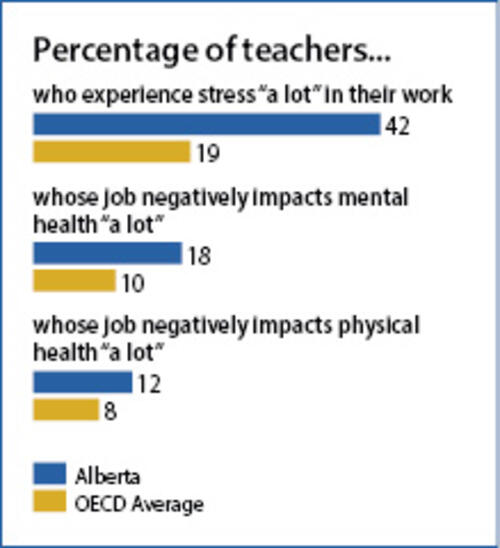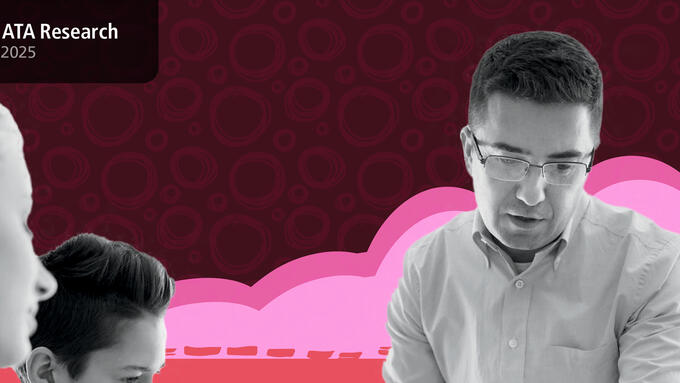The Organisation for Economic Co-operation and Development (OECD) Teaching and Learning International Survey (TALIS) examines the demographics, workloads, resources and working conditions of educators around the world. As the largest international educator survey, TALIS gathers insights from more than 280,000 teachers and school leaders across 55 education systems.
In 2024, Alberta was the only Canadian jurisdiction to participate in the survey, with responses from about 1,800 teachers and school leaders. While the province’s participation rate was lower than in previous years, which must be kept in mind when interpreting the results, the findings demonstrate how the profession is under pressure.
While a summary of TALIS results was shared previously, a more fulsome discussion of the findings and their implications is provided here.
Stress
In Alberta, 42 per cent of teachers report experiencing high levels of work-related stress, with the global average at just 19 per cent. This new data underscores a significant and escalating concern for Alberta teacher and school leader well-being under current classroom conditions.
- The top stressors identified by Alberta teachers include:
- having too much marking (52%),
- being responsible for students’ social and emotional well-being (51%),
- maintaining classroom discipline (48%) and
- modifying lessons for students with special educational needs (47%).
With the exception of maintaining classroom discipline, Alberta teachers’ sources of stress are reported to be at least 10 per cent higher than the OECD averages.
Weekly workload
Alberta teachers also rank near the top in the world for highest weekly work hours. The data show that Alberta teachers work 47 hours per week, which is behind only Japan, New Zealand and Singapore and is, on average, 5 hours more per week than all other countries.
A typical workweek for an Alberta teacher involves not only teaching students but also planning lessons, marking student assignments, taking on administrative duties, conducting and reporting student assessments, documenting student progress, engaging in professional development, leading student extracurricular activities and communicating with parents.
Disrespect
Since the last TALIS report in 2018, Alberta’s teachers have experienced the sharpest decline in how valued they feel by policymakers. Only 13 per cent of teachers now believe their views are respected by government, a 25-point drop—the largest drop among all OECD jurisdictions.
Classroom disruptions
Alberta teachers report spending about 20 per cent of their overall instructional time addressing behavioural issues in the classroom, up from 13 per cent in 2018. TALIS 2024 data mirrors Alberta Teachers’ Association research that indicates that Alberta is now in the top three education systems (out of 50 countries) in terms of the proportion of teachers who report spending substantial time managing classroom disruptions. Teachers and school leaders in this report continue to raise alarms about rising incidents of aggression, verbal abuse and intimidation, all signs of worsening classroom climates.
New teachers
Early-career teachers (those within the first five years of professional practice) are feeling this pressure most acutely. More than 40 per cent of beginning teachers in Alberta report frequent classroom interruptions, mirroring recent ATA research showing a sharp decline in beginning teachers’ confidence and sense of competence.
Of note, one in five teachers under 30—half of young teachers—plan to leave the profession within the next five years. For education systems already concerned about teacher shortages, these findings should be of particular interest.

Second-career teachers
TALIS 2024 also sheds light on another concerning trend: the low job satisfaction of second-career teachers—those who entered the profession from other fields.
In Alberta, 11 per cent of teachers come from previous careers, including the trades or other professional backgrounds. These teachers report 20 per cent lower job satisfaction than their peers, suggesting that those who transitioned into teaching later in life are finding it especially challenging to thrive under current conditions.
A clear warning
This report reinforces the current state of public education in Alberta and the difficulties teachers are facing daily. Taken together, Alberta’s TALIS 2024 results reveal a profession under pressure, where mounting workloads, rising stress and declining respect are eroding morale.
For policymakers and the public alike, these findings are a reminder that teachers’ working conditions are students’ learning conditions—and both are showing serious cracks.
The detailed findings of the OECD’s 2024 TALIS are available here: www.oecd.org/en/publications/2025/10/results-from-talis-2024_28fbde1d.html.



